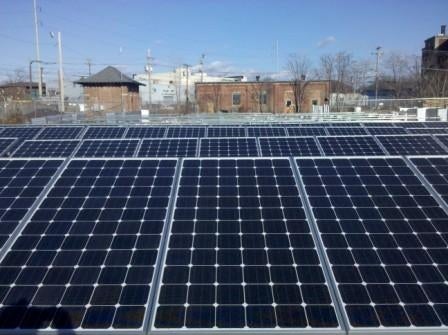Energy sector confident about pandemic operations
 National Grid's solar installation in Revere.
National Grid's solar installation in Revere.
The energy sector, like all segments of the economy, is adjusting to business in the age of COVID-19, but industry leaders said Thursday that their workforces are just as productive and major projects remain on track.
Speaking on a virtual panel organized by the New England Council, leaders from National Grid, Eversource and ENGIE said the energy industry is constantly planning for disruptions and while those disruptions typically come in the form of severe weather, a pandemic is among the possibilities that utilities keep a plan for.
"We're used to working on emergencies, we're an industry that actually has a pandemic plan," Jim Hunt, senior vice president for regulatory affairs for Eversource Energy, said. "Here in the Northeast we get hurricane seasons and summer thunderstorms so our workforce is used to rushing in to help support and adapt to whatever conditions we need to adapt to."
One thing many utility workers have had to adapt to is social or physical distancing on the job site. But Joe Dalton, project manger for ENGIE North America's MATEP LLC, said keeping extra space between people is not that different from the many other safety guidelines the industry follows.
"As an industry, safety really is the number one priority and I think social distancing, or physical distancing, is just an extension," he said. "It's just another sensible and necessary safety precaution ... it's just another piece of the safety approach that we take as an industry."
Recognizing that "reliable energy really is the foundation of our economy," Hunt said Eversource moved quickly at the start of the pandemic to get many of its workers set up with remote access and worked with government to ensure that it had proper protocols in place to allow essential work to continue. He said the company's major projects "are largely on track."
Marcy Reed, president of National Grid in Massachusetts, said there are "probably no long-term significant impacts" on project timelines because of the pandemic, but that some projects might experience slight delays as work ramps back up.
She said that between 8,000 and 10,000 National Grid employees out of a total of 17,000 across three states have been working from home under a policy the company adopted March 13. Remote work has reduced National Grid's occupied office footprint from 7.5 million square feet to 1.3 million square feet, she said.
Reed said many National Grid employees will continue to work from home "probably for months to come" and that the company's remote work plans have worked well.
"Honestly, I worry more about a hurricane coming through on a normal summer day than I do about can we manage the power and gas flows during a pandemic, because clearly we are," she said.
The one concern Reed flagged about having employees, including herself, working from home was that there is now less separation between someone's work life and their home life, which could lead to issues down the road.
"It's possible that we are even more productive but I think it comes with a cost. For example, my commute is now about 50 feet and the company is getting more hours out of me. I thought they got a lot before," she said. "I worry about that, actually. To think of all of our workers we have around the Northeast sitting like I am at a desk in my house, and I think we just have to be aware of that and watch for a little bit of burnout. People are working more hours because they can and they can't separate home from work."









0 Comments